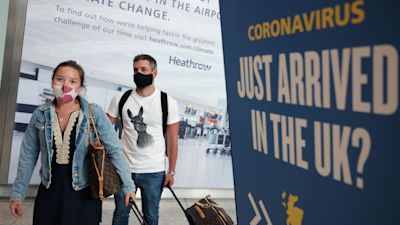Covid: South African and Brazilian coronavirus variants among 4,000 worldwide, vaccines minster says

There are 4,000 coronavirus mutations worldwide, a senior minister has said, but the UK is now capable of sequencing and manufacturing new vaccines designed to tackle new strains.
Vaccines minister Nadhim Zahawi said the UK is "in a really strong position" to deal with new variants due to having "around 50% of the world's genome sequencing capability" which means variants can be identified "rapidly".
Despite claiming the UK's "ability to sequence and then manufacture [new vaccines] at scale" is in a "good place", there are serious concerns about South African and Brazilian variants having an impact on the immunisation programme.
A door-to-door testing blitz of 80,000 homes in eight postcode areas of England is underway to contain all cases of the South African variant of Covid-19 after 105 cases were identified.
A mutation, known as E484K, which is found on both the South African and Brazilian variants, has also been discovered on a number of samples of the UK variant which was first identified in Kent.
Health Secretary Matt Hancock has described E484K as a "mutation of concern" and urged anyone in areas where it has been identified to "stay at home and only leave home where it is absolutely essential" to avoid spreading it.
Laboratory studies have shown that antibodies – which are produced by the body to counteract infection – are less able to bind to a part of the virus known as the spike protein, in order to stop it from unlocking human cells to gain entry.
Vaccines minister on UK's ability to tackle new Covid-19 strains
Mr Zahawi said one vaccine - being developed by drug firm Valneva, of which the UK has ordered 100 million doses, pending approval - is a "whole inactivated virus vaccine so it doesn't just work on the spike, it works on the whole body of the virus".
He said that vaccine has "huge potential" and the Oxford/AstraZeneca vaccine team is looking at "improving their vaccine to be able to deal with any variants, and of course Pfizer and Moderna are doing the same thing".
The government is under growing pressure to announce stricter border controls to ensure no more foreign variants of Covid-19 arrive in the UK.
Current rules ban any foreign nationals from travelling to the UK from South American and southern African nations, and anyone arriving to Britain from anywhere in the world must prove they have tested negative for coronavirus in the past 72 hours.
The government is also planning to bring in mandatory hotel quarantine for any Britons arriving from those countries, but critics say it should apply to all arrivals from all countries.
Health Secretary Matt Hancock would not confirm that details of the Government's hotel quarantine plan would be set out next week.
Covid: Which vaccines has the UK bought and how many doses of each?
Boris Johnson: New fast-spreading Covid-19 variant may be more deadly
Asked if there would be an announcement next week, he told reporters: "Of course we're working at pace to further strengthen the measures at the border but we've already put in place for isolation for everybody who arrives, wherever they come from in the world."
Mr Hancock said he discussed the issue with Australian ministers earlier on Thursday because they already have "quarantine hotels".
"We have been working to make sure that we get this right," he said.
Mr Hancock insisted "there isn't a delay, what there is is work to make sure that the border is always as secure as it needs to be".
Labour leader Sir Keir Starmer said the UK will be back to "square one" if a foreign variant arrives in the UK that is resistant to coronavirus.
"If a variant gets through that isn't subject to the vaccine, we are going to be back to square one and that will have months of impact on the economy, huge damage to the economy.
"So the risk is huge if we don't secure our borders and I think most people would say, 'For heaven's sake, now we've got the vaccine being rolled out, don't put that at risk'."
He accused the government of being in "chaos and confusion" over hotel quarantine measures, after they appeared to be delayed until next week, adding: "Surely, before you announce arrangements like this, you'd have done the planning beforehand."
Studies are already underway to assess whether vaccines offer protection from the new, faster spreading Covid-19 variants.
Last week Prime Minister Boris Johnson warned the Kent variant "may be associated with a higher degree of mortality".
Listen to the ITV News Politics Podcast: